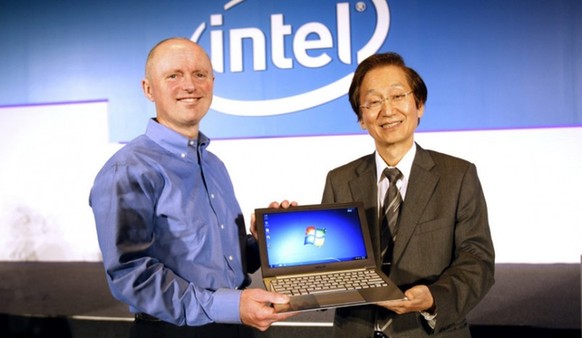Intel aims for a slice of Apple
 0 Comment(s)
0 Comment(s) Print
Print E-mail
China Daily, August 1, 2011
E-mail
China Daily, August 1, 2011
|
|
|
Intel's Executive Vice-President Sean Maloney said at a May conference in Taipei that by the end of 2012, 40 percent of consumer laptops would be in the form of ultrabooks. |
Is the era of the laptop coming to an end as the tablet nibbles away at the personal computer (PC) market?
That is the question some are posing following the latest move by one of the world's top processor innovators.
Intel Corp has linked up with PC manufacturers to launch its "ultrabook" strategy in an attempt to reclaim territory lost to the panel computer, especially to Apple Inc's iPad.
The Chinese market will soon see the first engagement of what promises to be an epic battle between two tech giants using their sharpest weapons, say analysts.
Intel's Executive Vice-President Sean Maloney said at a May conference in Taipei that by the end of 2012, 40 percent of consumer laptops would be in the form of ultrabooks, which will define the next generation of mobile computers with an enhanced performance, quicker response speed and a thinner, lighter frame.
Maloney was appointed as Intel's chairman in China after his recovery from a stroke. He will start working at the company's Beijing office in August.
"It is the first time a member of the top management team has been relocated to China. This marks an escalation of the importance of the Chinese market in Intel's global strategy," said Ian Yang, president of Intel China, adding that the China office will be a platform for Intel to draw up the company's global strategies after Maloney takes up his post.
The Chinese PC market will surpass the United States to be the world's No 1 by sales by 2012, with a global market share of 18.9 percent, according to a forecast by the International Data Corp.
Yang said he hopes Chinese customers will see the debut of the ultrabook, which is expected to "drive the third revolution of personal computer industry", after the appearances of Pentium in 1995 and Centrino in 2003.
Currently there are several major notebook manufacturers, including Lenovo, ASUS and Acer, negotiatiing with Intel over the details of launching their versions of the ultrabook.
ASUS's UX21, which was unveiled at the Taipei conference, is recognized as the first ultrabook ever made. The product will be officially on the market in winter. It is 17 millimeters thick, weighs 1.1 kilograms and has a 15.1 inch (38.35 centimeters) screen. In appearance it very much reminds customers of the MacBook Air.
The ultrabook is an evolving standard that will be upgraded annually, Yang said, adding that there will be more tablet-like features such as touch-screens and innovative forms such as a detachable structure.
According to Lu Dong, Intel's consumer notebook product manager in China, ultrabook is expected to sell for "under $1,000, maybe in the mainstream market at $799". In comparison, the Macbook air currently starts at $999.
Li Shuchong, CEO of ccidnet.com, an IT portal in China, said in an online commentary that the ultrabook is a "smart move" by Intel to bring the game back to its own tempo.
"When it comes to the era of mobile Internet, the innovation of application replaced the technology advantage as the key driver of the market. Consequently Intel was losing its edge," Li said.
The realization of the ultrabook strategy, which regulates strict standards on performance and form, depends very much on technology innovation, which is Intel's strong point, he said.
"But Intel still also needs to assemble more resources to achieve the success of the innovation. It requires the cooperation of the entire industrial chain, which may fall out of Intel's control," Li said.
Apple refused to comment on Intel's ultrabook strategy, but the Apple empire seems unassailable at the moment. The company recently announced there had been 15 billion downloads of Apple apps worldwide.
Apple's revenues from the Chinese mainland, Hong Kong and Taiwan increased six times to $3.8 billion in its fiscal 2011 third quarter ended on June 23, 2011, which marks the "significance of the China market to Apple's overall performance", according to Tim Cook, chief operations officer of the company.
"Apple's products are just like a sports car that you may want to take for a show-off ride with your friends. Using an iPad is like driving along the highway," said Chen Renshui, an experienced user of electronic devices.
"But no one wants to go to work in it. Plus, in China, there is always a 'speed limit'," he said, adding that input and document processing are still a problem for iPads, and the network speed in China also lowers the user experience.
"So I wouldn't mind replacing my notebook and iPad with one product that could deal with both work and entertainment. After all I only have a limited amount of space in my backpack."






